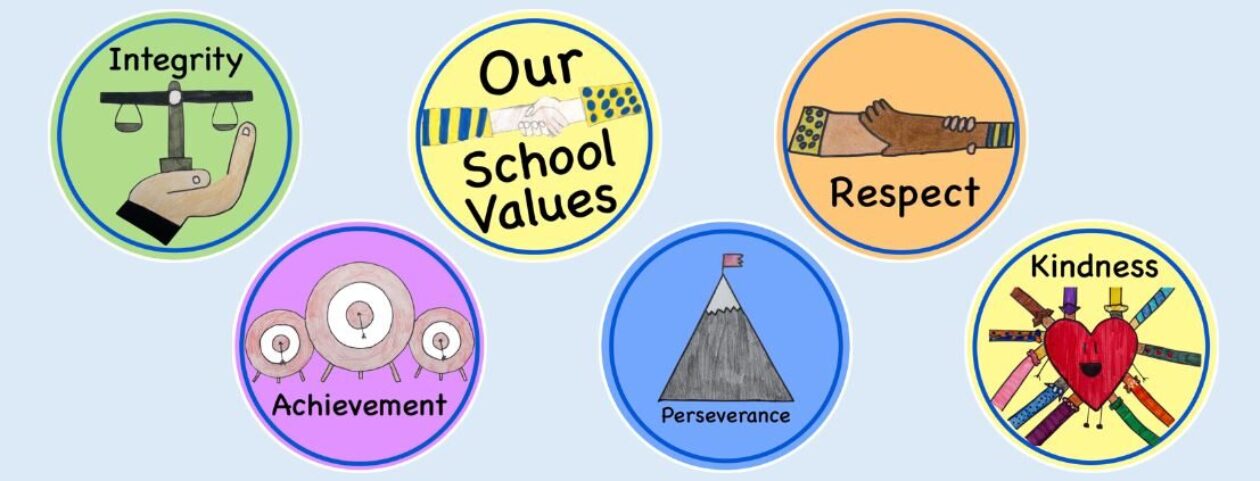Headteacher’s Presentation on The Curriculum – recording from recent Coffee Afternoon information session
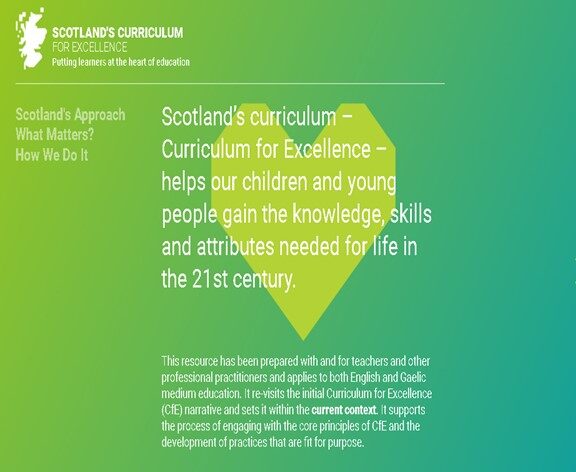
Information provided courtesy of Education Scotland Refreshed Narrative 2019.
Please refer to Education Scotland website for futher information regarding Scotland’s Approach.
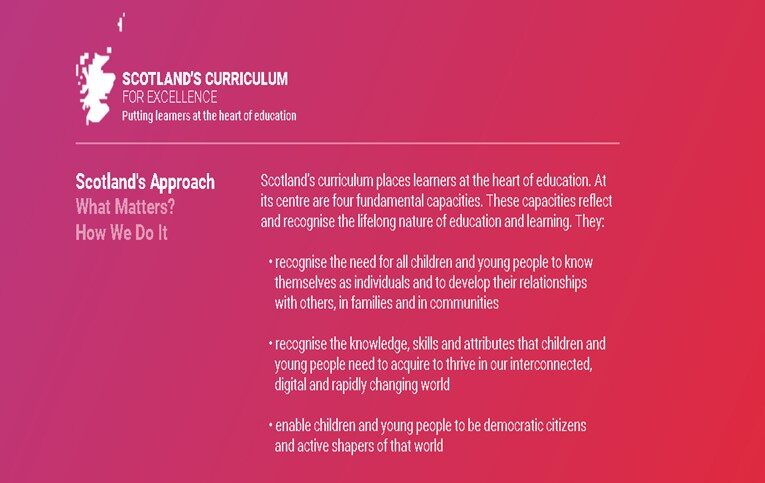
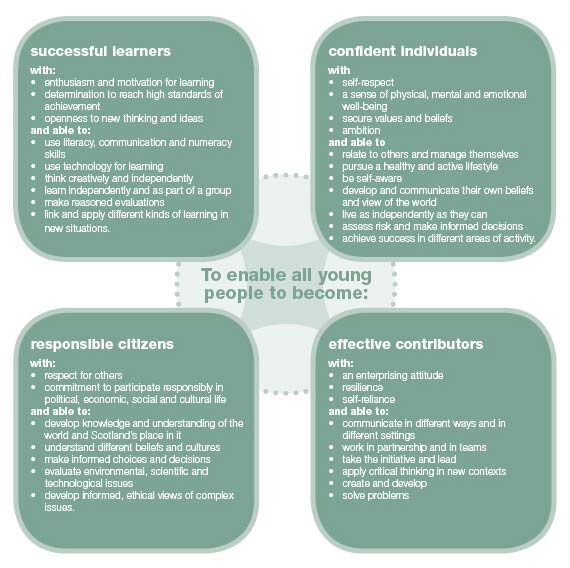
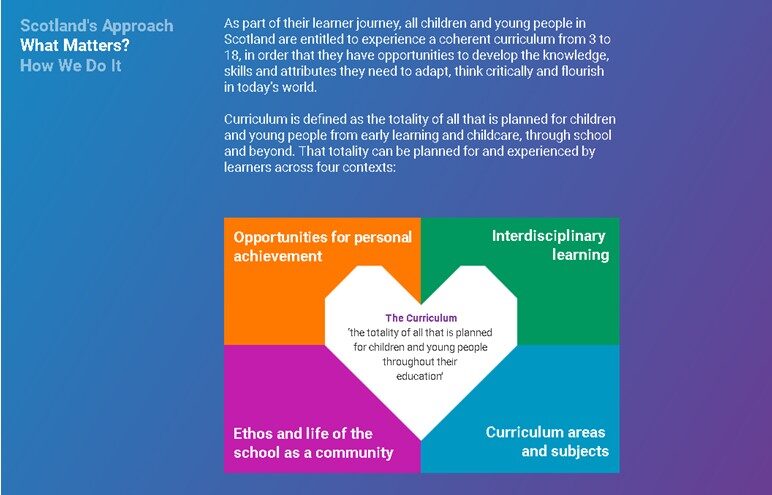
Individual settings and practitioners are empowered to make the decisions needed to provide a coherent, flexible and enriched curriculum that is adaptable and responsive to the diverse needs of individual learners and which reflects the uniqueness of their communities.
Opportunities for personal achievement
Personal achievement provides children and young people with a sense of satisfaction and helps to build motivation, resilience and confidence. The experiences and outcomes include opportunities for a range of achievements in the learning setting and beyond. All establishments need to plan to offer opportunities for achievement and to provide the support and encouragement which will enable children and young people to step forward to undertake activities which they find challenging. This is one of the key areas where schools need to work closely with a wide range of partners to help young people access information and opportunities and make their voices heard.
Interdisciplinary learning
The curriculum should include space/opportunities that enable children and young people to make connections between different areas of learning. Interdisciplinary learning should be stimulating, relevant and challenging. Revisiting a concept or skill from different perspectives deepens understanding and can make the curriculum more coherent and meaningful for learners. It can take advantage of opportunities to work with partners who are able to offer and support enriched learning experiences and opportunities for young people’s wider involvement in society.
Effective interdisciplinary learning:
• can take the form of individual one-off projects or longer courses of study
• is planned around clear purposes
• is based upon experiences and outcomes drawn from different curriculum
• areas or subjects within them
• ensures progression in skills and in knowledge and understanding
• can provide opportunities for mixed stage learning which is interest based.
Ethos and life of school as a community
The starting point for learning is a positive ethos and climate of respect and trust based upon shared values across the school community. All practitioners should contribute through open, positive, supportive relationships where children and young people will feel that they are listened to; promoting a climate in which children and young people feel safe and secure; modelling behaviour which promotes effective learning and wellbeing within the school community; and by being sensitive and responsive to each young person’s wellbeing.
Children and young people should be encouraged to contribute to the life and work of the school and to exercise their responsibilities as members of a community. This includes opportunities to participate responsibly in decision-making, to contribute as leaders and role models, offer support and service to others and play an active part
in putting the values of the school community into practice.
Curriculum areas and subjects
The curriculum areas are the organisers for setting out the experiences and outcomes and contribute to developing the four capacities. There are eight curriculum areas. Curriculum areas are not structures for timetabling: establishments and partnerships have the freedom to think creatively about how they can organise and plan for deep, sustained learning which meet the needs of their children and young people.
Subjects are drawn from the curriculum areas and provide a familiar structure for organising knowledge and skills. As young people move through the broad general education and into the senior phase they will experience increasing specialisation and greater depth, with a wide variety of subjects increasingly being the principal means of structuring learning and delivering outcomes.
Curriculum Entitlements
Children and young people’s rights and entitlements are central to Scotland’s curriculum and every child and young person is entitled to experience:
• a curriculum which is coherent from 3 to 18
• a broad general education, including well planned experiences and outcomes
across all the curriculum areas from early years through to S3. This includes understanding the world, Scotland’s place in it and the environment, referred
to as Learning for Sustainability
• a senior phase after S3, which provides opportunities to attain and achieve,
including to study for qualifications, awards and other planned activities to
develop the four capacities
• opportunities for developing skills for learning, skills for life and skills for work
• opportunities to maximise their individual potential, benefitting from appropriate
personal support and challenge
• support to help them move into positive and sustained destinations
beyond school
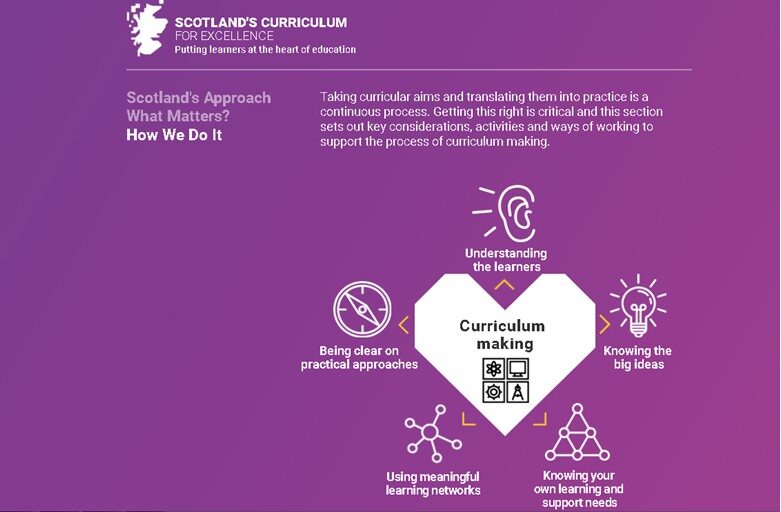
Taking curricular aims and translating them into practice is a continuous process. Getting this right is critical and this section sets out key considerations, activities and ways of working to support the process of curriculum making.
Understanding the learners
• Knowing children and young people and where they are on their individual learner journeys
• Listening to learners and being informed by their motivations and aspirations
• Empowering learners to have agency in their learning with opportunities for personalisation
• Using observations, assessments and feedback to design and develop the learning
Knowing the big ideas
• Maximising opportunities that develop the four capacities for learners, making clear links to future skills, for example meta-skills
• Understanding and sharing the pleasure and benefits that come from learning
• Being clear on the knowledge and skills that underpin individual curriculum areas
• Being informed by shared vision, values and aims, locally and nationally
• Understanding drivers for improvement and how they align at national
and local levels
• Being responsible for the development of literacy, numeracy and health
and wellbeing across the whole curriculum for all learners. This includes
digital literacy skills
Being clear on practical approaches
• Having clear strategies for delivering excellence and equity for learners
• Agreeing the pedagogies that are best for purpose and the development needs of learners
• Reviewing and refining the curriculum against the seven design principles.
• Ensuring learners have clear progression pathways
• Making clear links between learning and the world of work
• Embedding Creativity and Learning for Sustainability in curriculum design
• Using knowledge of the local community and robust data to inform the curriculum offer
• Articulating and sharing curriculum rationale and narrative
Using meaningful learning networks
• Planning, enquiring and reflecting with other practitioners to optimise impact
• Collaborating with parents, carers, families and the community
• Developing and maximising the opportunities derived from partnerships across
clusters, local authorities and Regional Improvement Collaboratives
• Building partnerships with colleges, employers, universities, the third sector and others to co-design the curriculum
• Using the outdoors and our built and cultural heritage to support learning
• Sharing, celebrating and reflecting on successes
Knowing your own learning and support needs
• Committing to career-long professional learning based around high quality, rigorous professional standards
• Committing to meaningful professional review and development
• Belonging to communities of practice and enquiry
• Developing collaborative practice locally, nationally and globally
The design principles:
• Challenge and enjoyment • Breadth • Progression • Depth • Personalisation and choice • Coherence • Relevance
Regional Improvement Collaboratives bring local authorities together, alongside Education Scotland, to secure excellence and equity in education. They facilitate collaborative working across the region, developing different ways of working together to build excellence and equity in the Scottish education system.
